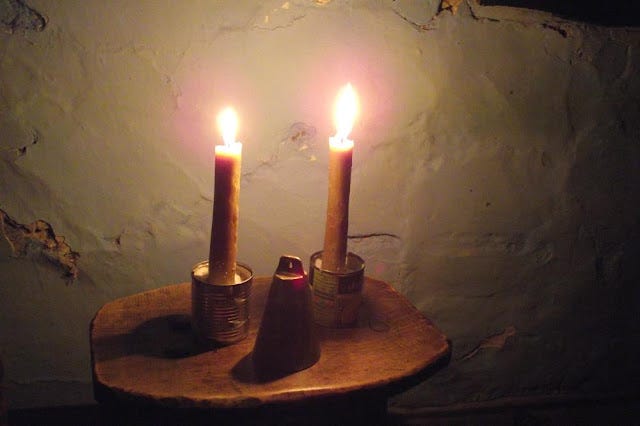Discovering the Essence of Community: Lessons from a Decade Abroad
Written on
Chapter 1: The Journey of Self-Discovery
Over the past ten years, I have often reflected on my experiences, choosing to share images of landscapes or solitary moments rather than the people involved. This reflects my personal narrative and the memories I've cultivated.
I recall a story about a woman who spent several hours trapped in an elevator. When she was finally rescued, everyone marveled at her calm demeanor. "Oh, that was nothing," she remarked, "when I was in my twenties, I found myself stuck in an elevator on New Year's Eve with four men and several bags of wine and treats." Intrigued, her audience pressed her for details. "Well," she grinned, "from that elevator emerged five individuals, each with their own tale."
Our collective journey has produced countless narratives, each unique yet intertwined. I cherish this diversity, especially when reflecting on our shared missteps. Each of us has lessons to learn, and while we attended the same "class," our individual takeaways varied widely. My lessons revolved around co-dependence, self-worth, unconditional love, and self-assurance. As for my partner’s journey, that is his story to share.
Currently, I am engaging with "The Book of Forgiving: The Fourfold Path for Healing Ourselves and Our World," co-authored by Nobel Laureate Archbishop Desmond Tutu and his daughter, Revd Mpho Tutu. I anticipate this exploration will take months, filled with exercises that are both challenging and deeply impactful. The writing is poignant and raw, capturing immense suffering alongside a profound sense of compassion as conveyed by the narrators, Mpho Tutu and Hakeem Kae Kazim. This powerful blend is humbling, compelling me to pause and reflect before progressing further.
A striking concept from the book is Ubuntu, which embodies the essence of humanity. It articulates our interconnectedness and the notion that one cannot exist in isolation. This philosophy emphasizes that our actions impact the entire world; when we thrive, it benefits all of humanity.
I firmly believe in this interconnectedness. Even the most reclusive mystics remain tethered to this principle, albeit at a heightened level of awareness.
This realization led to our initial misstep: attempting to create a community while distancing ourselves from the world. I had hoped our community project would revive my relationship with my partner, even as we discussed separation. I naively thought that embarking on a "new project" would signal a fresh start.
Spoiler alert: it didn’t. Instead, my expectations only compounded my suffering and internal struggle.
With our living space finally ready, we turned our attention to more practical matters. We stocked up on fresh vegetables, filled numerous jars, and acquired a variety of flours—wheat, rye, buckwheat, and corn—as well as ample oil, cheese for brining, and enough cabbage for an entire barrel of sauerkraut.

Did I mention that we spent our initial months without electricity? I didn’t want to alarm anyone! However, we adapted, relying on a nearby house to charge our devices. We embraced this new lifestyle, finding joy in our busy days and the fatigue that came with them.
We even crafted our own beeswax candles, despite their higher cost compared to store-bought ones. This experience nurtured our confidence in our ability to learn new skills. The internet proved invaluable, providing us with knowledge without needing to leave our home. Nonetheless, our lack of electricity forced us to utilize the information we had gathered prior to our mountain retreat.
We invested countless hours fixing and improving our home, and eventually, it became presentable enough for guests. Many people expressed a desire to visit, inspired by our journey toward community living.
I cherished these connections, meeting many passionate individuals with fascinating stories. We formed beautiful friendships and welcomed others to join us.
Looking back, I recognize that this was a miscalculation—not because of the individuals we invited, but because we lacked clarity about our core purpose.
I often reference Simon Sinek’s concept of starting with “why.” His TED Talk struck a chord because many of us seek to understand our motivations. While financial gain or travel may initially seem compelling, these reasons falter when faced with deeper emotional struggles, like anxiety or despair.
There must be a more profound reason for our actions. As Nietzsche wisely stated, “He who has a why to live for can bear almost any how.” Dismissing Simon Sinek’s optimism as unrealistic would be shortsighted, especially considering Nietzsche's profound understanding of human nature.
I resonate with the idea of Finding Your Why and the “circle” concept that Sinek's colleagues informally dubbed it.
Reflecting on our experiences, it becomes clear that we made two significant errors: lacking a clear “WHY” and confusing our goals with our true cause.
More on this in the next chapter!
If you enjoyed this narrative and wish to delve deeper, here’s the complete episode list:
10 Years of Living Outside of The Box
The most beautiful lessons I’ve learned while trying to start and join an intentional community.
The first video titled "10 Life Lessons I Learned While Living Abroad" explores transformative experiences that shape our understanding of community and connection.
The second video "A Valuable Lesson For A Happier Life" shares insights on the importance of purpose and community in leading a fulfilling life.
Thank you for joining me on this journey of reflection.